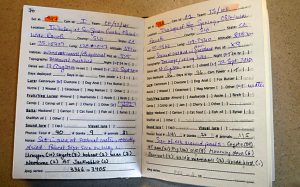By Aisha Uduman
I am currently in Sri Lanka, at the start of my fieldwork season investigating ecological and social dimensions of leopard-livestock conflict in two rural dairy farming communities. The last few months have been a whirlwind of courses, project and proposal finalisation, grant writing and fieldwork prep, so I thought it would be good to share what I’ve learned so far, in hopes it can be of use to those about to venture out into the field themselves!
Pre-departure
Preparation
Fieldwork is exciting in a very unique, uncertain way. To me, getting prepared fell along the lines of “expect the best but plan for the worst”. Before setting off to collect your data, here are some things that I have learned are important to consider:
- Critically evaluate your research design: Methods? Location? Data to be collected? Acknowledge and be prepared for things to change once you arrive.
- Equipment: How many? Where can they be purchased? Additional necessities (batteries, locks, tapes, etc.)? Practice handling, installing and downloading the data from the equipment so set-up can be as smooth as possible.
- Specific skills needed: Language(s) required? Knowledge of GIS and statistical software? Personality traits for interdisciplinary work? Do you have all these skills, or do you have plans to collaborate with those who can fill any missing gaps?
- Logistics: Accommodation? Transport? Medical facilities? Get written confirmation for as many agreed upon arrangements as possible, as people may change their minds, especially if plans are tentative (trust me) – potentially hindering your ability to carry out your project.
Grants
I came into my MSc with an unfunded project. I had a slight idea of the grant-writing process and how competitive it has become these days, but it was definitely a reality shock for me the first few months! I originally thought that once I wrote one or two grant proposals, I could use those as a template and work off of them…oh, how misguided I was. Each grant seems to be unique, asks for slightly different things and has different reference requirements. Most of all, as my project ideas kept shifting and evolving, that was reflected in my various grant applications throughout the last few months. After submitting 10 grants, I finally heard that I had been awarded a Rufford Small Grant of 5000 GBP, enough to cover a vast majority of my field costs. Hard work pays off, so keep at it!
Be realistic
It’s important to have contingency plans in the event that your initial plans fall through. Think about what supplementary datasets are available, what workable data your supervisor already has, and what your potential timelines will be. In the unfortunate event that your ideal plans fall through, having realistic back-ups will hopefully help to keep the stress levels at a reasonable level.
Post-arrival
Visit your study sites
As I write this post, I am staying at a guest house on Kirinda beach, about 20 minutes from one of my study sites in the south-east coastal belt of Sri Lanka. My journey here involved a 2-hour bus ride plus another 5-hour bus ride on winding, dusty roads. I ended up almost passing out from the heat and dehydration as I was scared to drink too much water and needing to relieve myself mid-way through the bumpy bus ride. My point is, a little trial-run or preliminary field visit such as what I’m doing can immediately inform you of the kinds of considerations you will need to keep in mind when constantly going out into the field.
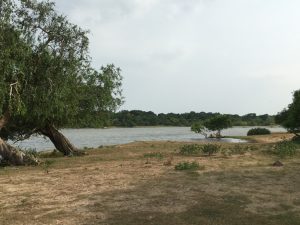
Getting a sense of the local terrain, distances that need to be walked, temperatures etc. as soon as possible will help me further plan out field schedules and more realistic daily goals than what I had initially planned for from the lab in Canada!
Reach out to local researchers/knowledge-holders
In a place like Sri Lanka, it’s all about contacts. I utilised whatever contacts I had – friends of my parents, friends of my parent’s friends, relatives of a friend of my cousin, you name it. In a place where I’m considered a foreigner, it helps to have some local, trustworthy contacts that I can rely on. Likewise, there are very few people studying leopards in this country, and so in the span of a week I was able to meet with all of them. This has helped me to get perspective from different people and use their acquired insight and knowledge to improve my own research design.
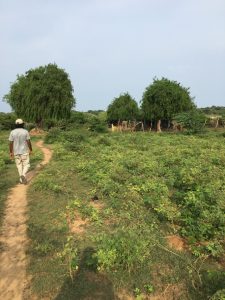
Talking to a naturalist from the area who is familiar with the flora, fauna and human-imposed threats around these systems is crucial. Now I know to always look down for snares and wires, and to carry a stick with me at all times!
Plan for the details
Food
- Always at the forefront of my mind, for me food is something that can either elevate my mood at the end of a rough field day, or just cause it to plummet into more grief and exhaustion. Sri Lanka is extremely hot and humid, so it’s important to eat enough and get substantial calories to keep me going for the day. My solution? I brought Nutella, peanut butter, coffee, hot chocolate and instant oatmeal from Canada and will stock the field station with that. Not the healthiest, but good for quick energy that doesn’t need to be cooked. Dinners thankfully can be bought from town, and I am enjoying the local cuisine.
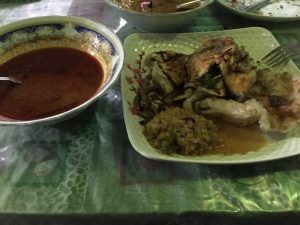
An egg and veggie roti with chicken gravy and lentils, at the end of a short but exhausting field day. We befriended the local kadey (small food shop) owner and now I’ll look forward to eating there at the end of longer and more exhausting field days.
Clothing
- Life is about trade-offs, isn’t it? Today I had to decide whether to wear a t-shirt and experience some semblance of a breeze on this hot, humid, 34°C day, or to be smart and wear long-sleeves and protect myself from the sun and mosquitoes both, but risk overheating as I tend to do. Choices! You live and learn. Pack for any and all occasions and know your local conditions – I’m leaving the fleece in Canada but brought plenty of shirts, socks and undergarments in preparation for the excessive sweating and showering I will be doing while I’m here.

This photo was taken at 3 pm, when the weather app on my phone rudely informed me it “felt like” 39°C. Multiple people asked me if I was okay, on account of my bright red face and pools of sweat rolling down it. Unfortunately, I don’t have the option of wearing shorts and a t-shirt like my male counterparts, so this will be the new norm for me. Ah, the tropics!
Local customs and holidays
- Sri Lanka is the best country for getting days off work: all Buddhist, Muslim, Hindu and Christian holidays are celebrated here, which is good if you work a boring job, but bad if you are rushed for time and need to get things done (like me)! I arrived early April, right before the country went into a 2-week stand-still during the Sinhala and Tamil New Year celebrations. Additionally, national holidays such as Vesak and Poya days (full moon monthly holidays) mean transit systems, government offices, banks and most private offices are closed – note these down and plan your schedule accordingly.

Information missing from this greeting card: “Everything will be closed for 2 weeks, best of luck getting organised!”
Local threats
- I’m talking everything from dengue-transmitting mosquitoes, to leftover trap guns and live wires that may be set up by poachers to catch wild boar. Know your environment, and if you don’t, do some research before venturing out. The best thing you can do is talk to locals – for example, I am talking to safari guides, naturalists, local farmers about the kinds of threats I will be facing in order to adequately prepare. I realise that hours of online research was only about half as informative as a simple 10 minute conversation with someone from the area. Be enthusiastic but be smart.

Do natural insect repellents work? After trying 4/5 of these, I have to answer ‘no’…maybe the mosquitoes in North America aren’t as virulent as the ones here, but I have resigned myself to using DEET repellents because…well, dengue.
Keep track of what you do
I can’t stress this enough. I’ll admit, I’m far from being the most organised person around…and despite knowing where everything is in my head, that doesn’t serve much purpose for anyone else, or even myself later on when I’m too stressed to remember my own address. This is arguably the most important advice I can give – keep a record of everything you do, whether it’s in a notebook or your phone (they both have their own pros/cons), and back it up regularly. It is a practice that is worth taking the time to foster into a habit. I am only just beginning my fieldwork but I can only imagine how useful this record will be months from now when I’m writing up my work and trying to remember my process.
Have fun!
Cheesy, right? But as a worrywart, sometimes I find myself almost looking for things to stress out about. Conducting research in a different setting is an exciting experience – make use of this time and remember to have fun in your downtime. Explore, interact with people different to you, appreciate the local idiosyncrasies while you can because before you know it, you’ll be back in the lab losing hair while analysing your data and missing your time away in the field!
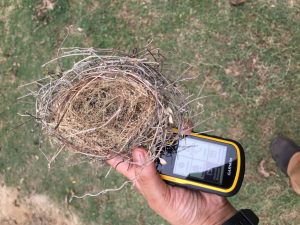
One of my favourite things to do: finding cool wildlife remnants around my field sites. We found this bird nest on the ground, and I just had to stop and appreciate the intricacy and effort that went into it.
If you want to keep updated with my work (successes and failures both!), follow me on twitter (@aisha_uduman) or my blog (https://aishauduman.wordpress.com)
